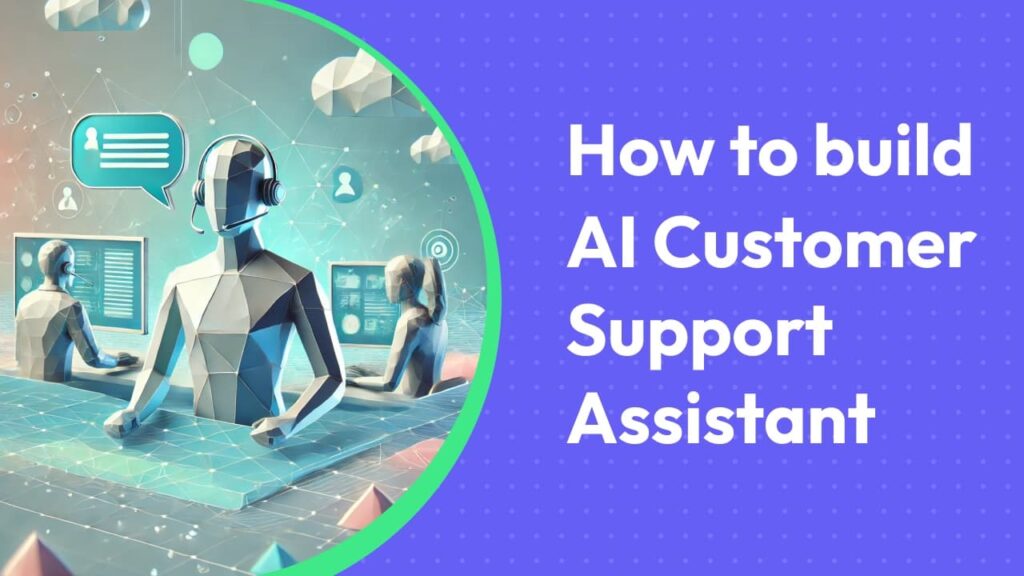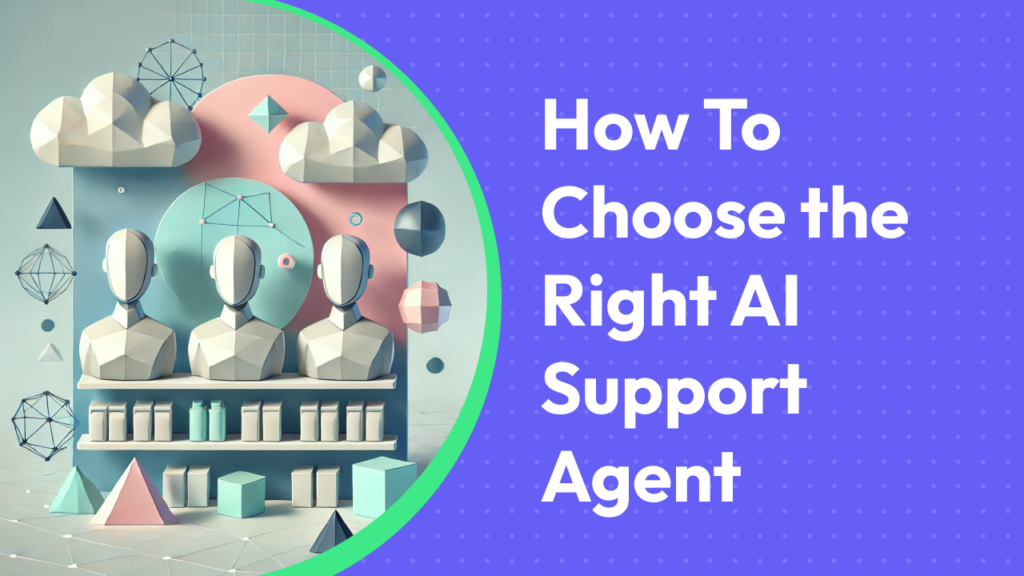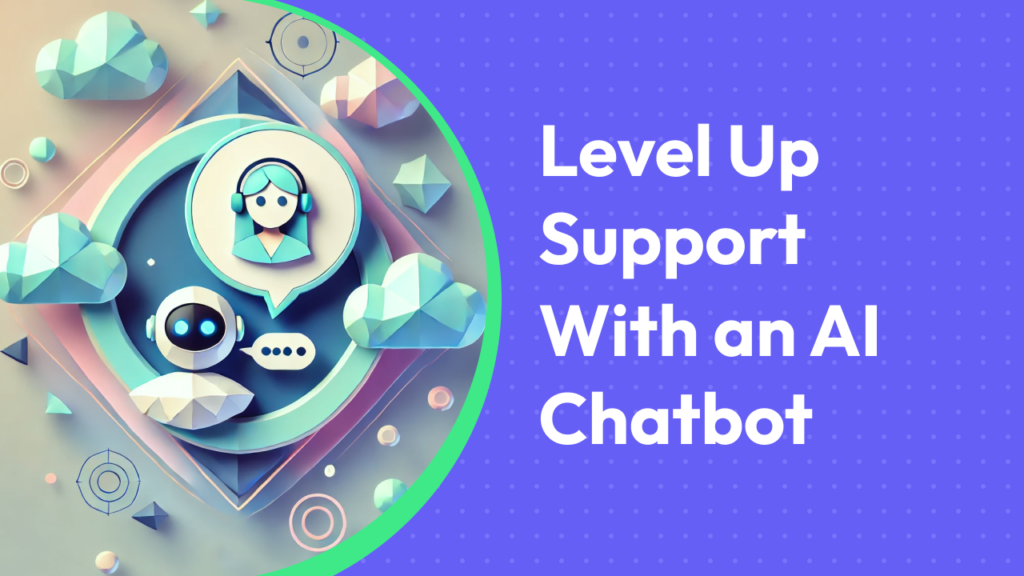- What Is AI Customer Service Agent?
- What Is Human Customer Service Agent?
- AI Customer Service Agent and Human Agent: Head-to-Head Comparison
- Key Differences Between AI and Human Agents
- Hybrid Customer Service Models
- FAQs
The change and pace of artificial intelligence are exciting to watch, aren’t they? The future is coming right before our eyes: artificial intelligence is infiltrating every aspect of our lives, confidently taking over even customer service. Some brands are immersing customers in the most personalized customer experience possible 24/7. According to McKinsey, it allows companies to reduce customer acquisition costs by 50% and increase revenue by 5-15%. IBM claims that using chatbots and AI solutions in customer service can reduce customer service costs by up to 30%.
Automated customer service solutions, such as AI customer service agents, chatbots, and virtual assistants are improving and optimizing the customer support experience. But can these AI-powered tools truly replace human agents, or is a hybrid approach the best way forward?

Let’s explore this question together and find out:
- How does a customer service AI agent work?
- What benefits and risks does each approach bring with it?
- How do companies benefit from implementing such tools?
- Which option is best for businesses — AI agent or classic human customer service?
- Will AI agents replace human support staff?
You’ll discover everything you need to create the perfect customer service support.
So let’s get started!
What Is AI Customer Service Agent?
Alright, let’s dive into the nitty-gritty of the AI agent for customer service. It is an intelligent system that autonomously interacts with customers through various channels. Such an agent solves a wide range of user queries:
- analyzes customer behavior and interaction history;
- automatically recognizes intentions;
- provides tailored answers to various questions.
Believe me, this is not the whole list of AI agent capabilities!
I suggest considering several types of AI customer service agents that companies can implement to process frequent routine requests and solve certain tasks:
- Chatbots. Learning-based chatbots communicate with customers in real time via text messages, using a wealth of information from their knowledge bases [including PDF files] to provide accurate answers. With OmniMind, you can create a chatbot for an automated support service in minutes. The platform adapts to the specifics of companies from various fields and easily integrates with websites, messengers, and work tools, such as Slack. OmniMind’s chatbots don’t just answer questions. They adjust to the flow of the conversation, which strengthens your brand’s connection with your customers. With more than 50 languages supported, you can reach a global audience.
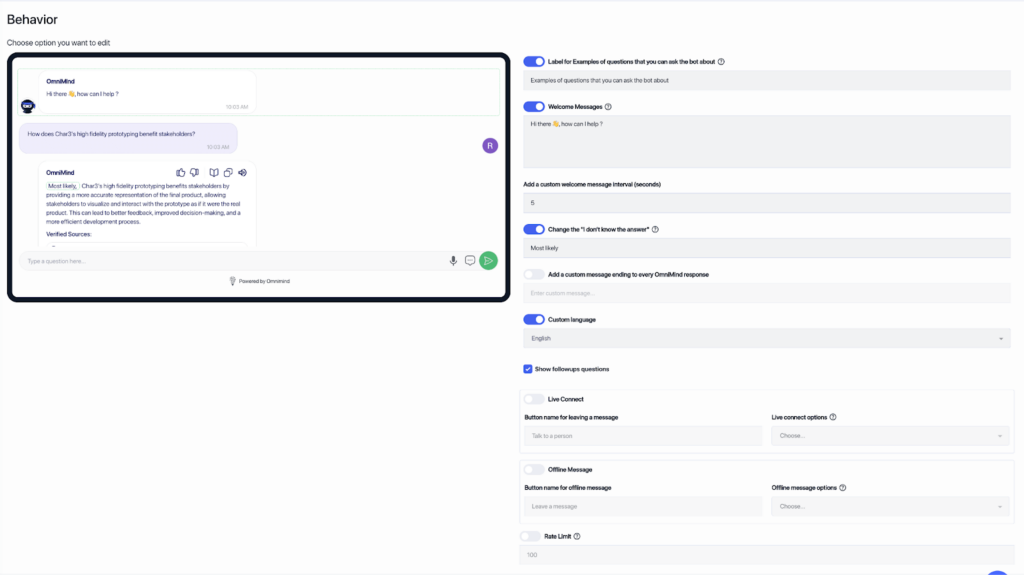
- Voice assistants. They can guide callers through menus and options, answer voice requests, and perform a variety of tasks, such as placing an order or finding specific information. You can create a voice AI agent on the Ada platform and integrate it into your customer service technology stack and all major communication channels: website, mobile apps, texting, Instagram, messengers, and the work of call centers. A voice AI assistant reduces the cost of each customer interaction and shortens the average turnaround time while improving customer satisfaction.

Google’s Dialogflow cloud-based speech recognition and synthesis service allows you to create chatbots and voice assistants for round-the-clock customer service. The platform supports more than 30 languages and offers ready-made agents. Depending on the selected agent, you can customize your own IVR.
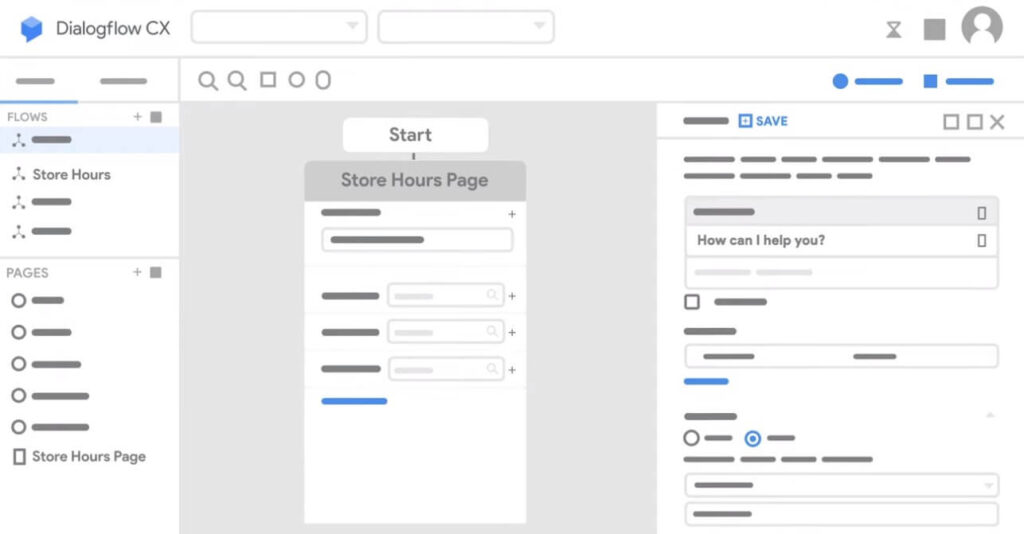
- Virtual agents. These consultants analyze large amounts of data and provide personalized product recommendations or troubleshoot technical issues, such as password resets. Zendesk’s customer service offers a wide range of AI-based tools, including chatbots and AI agents to answer calls. The platform helps companies collect and organize customer inquiries, track their status, and provide answers. Thanks to The Netomi Virtual Agent by Zendesk, the time to respond to customer questions in emails and chats at any time of the day is significantly reduced.

With AI Agent, it’s as if your support team anticipates your customers’ needs, instantly answering and simultaneously handling multiple user requests through all possible channels — phone, messengers, live chat on the website or on social networks, email, and voice.
For example, the Freshdesk platform offers such five-star support across all possible channels. The world’s largest diamond retailer, Blue Nile, uses a CRM platform from Freshworks that provides a complete picture of every customer journey. With information on customer preferences, past purchases, and signals of intent, the Blue Nile team offers customers a more personalized experience, closing 90% of customer issues at the first point of contact while increasing sales.

Today, the customer service AI agent is becoming the gold standard of customer service. 60% of organizations have implemented AI-powered customer service tools for IT help desks. AI is changing the way we work, positively impacting customer service, and helping businesses meet their growing expectations.
Wonder if AI customer service agents will replace humans in customer service in the future? For now, such solutions automate routine repetitive tasks, while staff can focus on creative and more complex tasks. To better understand the capabilities and limitations of both customer service AI agents and human agents, let’s delve deeper into their specific strengths and weaknesses.
Key Features of AI Customer Service Agent
To call AI agents indispensable assistants is too banal. They are real special agents, trained for the most complex operations in any environment. Let’s take a look at the features that make AI agents so effective:
- Automatic responses. Agents can quickly and accurately answer customers’ frequently asked questions (FAQs).
- Simplified transactions. AI agents can help customers with simple tasks like fixing an appointment, placing orders, or processing payments, making self-service convenient and fast.
- Human expert referrals. By analyzing customer queries, the AI agent for customer service can direct complex problems to the most appropriate expert, ensuring timely and efficient resolution.
- Personalized recommendations. AI agents analyze customer behavior and preferences to offer personalized product recommendations. This approach increases customer satisfaction and drives sales.
With AI customer service agents, customers get automated support at any stage of interaction without even realizing it. Instant, personalized responses based on customer data, preferences, behaviors, and past interactions increase customer loyalty and trust in the company. Do you think this is possible without human empathy?
Of course, yes! So let’s look at the benefits of the AI agent for customer service.
Key Advantages of AI Customer Service Agent
AI has fundamentally changed the customer service industry, offering businesses a compelling argument:
- 24/7 Availability. AI agents are available 24/7, providing customers with anytime support. Instant response to queries increases customer satisfaction.
- Cost Efficiency. Automating routine tasks reduces staffing costs.
- Speed. A customer service AI agent responds much faster than a human. In addition, it handles a large number of requests simultaneously and significantly reduces the time spent waiting for a question.
- Scalability. Depending on business needs, you can customize and implement AI solutions, increase or decrease the number of AI agents in a matter of minutes.
- Consistency. AI agents use huge amounts of data to find accurate answers to customer questions, are always learning, and provide the same high quality of service without the risk of human error.
Cons of AI Customer Service Agent
The AI agent for customer service is not perfect yet and has some shortcomings:
- Lack of Emotional Intelligence. They may not effectively solve complex customer problems that require deep understanding, human involvement, and compassion. AI agents may have difficulty detecting emotional cues such as sarcasm, irony, or frustration.
- Limited Contextual Understanding. AI agents may have difficulty understanding or nuancing customer queries, which can lead to inaccurate or irrelevant responses and consequent customer frustration.
- Dependence on Data Quality. The effectiveness of AI customer service agents depends on the quality and accuracy of the training data. Outdated, inaccurate, or insufficient data leads to unreliable responses and ineffective query solutions.
- Inability to Handle Unforeseen Scenarios. In novel or unexpected situations, AI agents may have difficulty providing accurate, useful, or correct answers. This is an obstacle for problems that require creative solutions or critical thinking.
- Security and Privacy Concerns. The deployment of AI agents raises concerns for many about the privacy and security of customer data, unauthorized access, or data leakage. It is important to implement robust security measures to protect sensitive consumer information.
While AI agents excel at efficiency and speed, human agents bring a unique set of skills to the table. Now let’s understand the features of a Human Customer Service Agent step by step.
What Is Human Customer Service Agent?
As much as we all get excited about the advancement of technology, the good old classic is timeless. The human customer service agent interacts directly with customers, answering questions and solving problems. These agents are often the first point of contact for customers who need help.
Human agents are responsible for resolving a variety of inquiries:
- complaint handling;
- assisting in the use of the product;
- troubleshooting technical problems;
- responding to general inquiries;
- customer support.
Although AI agents are becoming increasingly sophisticated, intelligent, and autonomous, many industries still rely on human support agents. However, even the healthcare industry is increasingly utilizing AI agents. Even today, they can keep patient appointments, update health insurance, answer common questions about medications, provide personalized treatment recommendations, resolve medical device issues, and refer queries to a Human Agent when necessary.
Key Advantages of Human Customer Service Agents
The most important advantages of human agents are:
- Empathy and Emotional Intelligence. Humans have a unique ability to understand and empathize. We pick up on subtle nuances in communication, which allows us to better understand the needs of our interlocutor. Human interaction helps create a strong emotional bond with the client, which increases client loyalty and satisfaction. In difficult or stressful situations, the client needs support, not just information.
- Personalized Problem-Solving. Thanks to creative thinking, people find non-standard solutions that go beyond algorithms. In addition, support staff take into account many nuances, such as cultural differences or the context of the situation. This makes interactions more personalized.
- Trust and Brand Loyalty. Support staff are able to build long-term trusting relationships with your customers. This increases customer loyalty and strengthens brand reputation.
However, human agents also have their limitations. Let’s also review them.
Cons of Human Customer Service Agent
Despite the unique advantages of human resources, I will add a dose of skepticism and briefly note a few disadvantages:
- Limited Capacity. Let’s be honest, we are all human and have our limits. Handling a huge number of requests at the same time is simply impossible. This leads to customers having to wait a long time for a response, which naturally reduces their satisfaction.
- Personal Biases. Subjectivity and personal preferences affect the quality, consistency, and even fairness of customer service.
- Ongoing Training. To stay on top of their game, support staff must constantly learn new product information, industry trends, and customer service practices. This is commendable, but it requires time and financial commitment. And when resources are limited, you have to choose what to emphasize.
- High Operational Costs. Establishing and maintaining a contact center, employee salaries, equipment, and training costs require serious investment.
So which option should you choose for your help desk — AI agents or people?
AI Customer Service Agent and Human Agent: Head-to-Head Comparison
Who is better at handling customer service issues — a soulless machine that runs on algorithms or a live person with empathy? Each of them has their own strengths. Let’s find out in which situations it is better to use AI agents, and when the human factor is irreplaceable.
- Cost. AI agents tend to be cheaper to operate because they don’t require salaries, vacations, and other social benefits.
- Speed. AI-based solutions bypass humans at the speed of light. A customer service AI agent can handle large volumes of requests simultaneously and deliver a fast response.
- Efficiency. AI agents work around the clock without interruption.
- Consistency. AI agents give the same answer to the same question, without loss of service quality, human error, or mood-related service differences.
- Scalability. AI agents are really hard workers who don’t get tired or complain. If your business experiences peak workloads during the holidays or sales, you can increase the number of AI agents. They can easily handle any amount of work. Hiring and training the same number of people is an expensive task.
- Data Analysis. It takes time for a human to find the necessary information in a huge database. AI agents do it in a fraction of a second. They also scan the history of the customer’s interactions with the company to find the most appropriate solution.
- Emotional Support. When it comes to solving problems that require deep understanding and empathy, humans are still indispensable. Emotional intelligence and the ability to make an emotional connection with customers allow them to find customized solutions and provide high-quality service.
- Adaptability. Although AI agents can be trained to perform different tasks, their adaptability is limited by programming. Humans have more flexibility to adapt to new situations and unforeseen scenarios.
- Complex Issues. If a situation requires deep contextual understanding and creativity, humans are better able to handle such challenges.
- Personalization. A rather controversial aspect where there can be a “tie”. AI-based agent coaching customer service and humans can provide a more personalized service tailored to the individual needs of each customer.
The choice between an AI agent and a human agent depends on the specific situation. In many cases, a balance will be the best solution. AI agents are great at handling routine tasks, freeing up employees for more creative work and complex customer interactions.
Key Differences Between AI and Human Agents
AI services greatly enhance customer service capabilities. Despite all the advantages of AI customer service agents, the human factor remains indispensable.
Here’s a quick comparison of AI and human agents:
| AI Agents | Human Agents | |
| Interaction Quality | AI is great at handling routine, structured, and repetitive tasks. Can process large numbers of requests quickly | Humans are better at understanding context and recognizing emotions, which is especially important when dealing with complex, emotional issues |
| Decision-Making | AI agent for customer service acts strictly according to predefined algorithms. It quickly finds a solution in its database but is not capable of creative thinking | Humans rely on experience, intuition, and common sense to make non-standard decisions in complex situations |
| Training and Maintenance | AI requires constant updates, tweaking, and refinement of algorithms | Human agents must also be constantly trained, developed, and upgraded |
| Costs Over Time | A customer service AI agent is cost-effective in the long run by automating routine tasks | Personnel needs to be budgeted for ongoing salary, training, and welfare costs |
The choice between AI and humans is a matter of balance. Each has its strengths, and the optimal solution depends on a company’s specific goals and objectives. In many cases, a hybrid approach that combines the strengths of both AI and human agents can provide the best possible customer experience.
Hybrid Customer Service Models
The most effective strategy for customer service is a combination of AI agents and human agents. This combination utilizes the strengths of both to deliver an exceptional customer experience. Believe me, this is where the real magic begins!
AI agents handle high volumes of inquiries quickly, answer FAQs instantly, and provide information about products and services. They can categorize customer requests and direct them to the appropriate specialists. A customer service AI agent is a great guide for user navigation on a website and can provide personalized answers to everyone.
Human agents can solve complex problems that require creative thinking and critical analysis, respond to customer emotions, and build stronger relationships.
You’re probably wondering what this combination looks like in practice. Here are some examples of successful hybrid models.
Amazon and Walmart use AI-based chatbots to handle customer requests for orders, product information, or store locator. In complex situations, customer inquiries are handed off to human agents.

Bank of America “works” with Erica, a virtual financial assistant that answers customers’ questions about account balances and recent transactions, reminds them to pay scheduled bills and notifies of credit rating changes.


In banking, human agents are required to work with VIP customers or for sensitive issues — loan approval or investment counseling.
With OmniMind’s platform, you can set up AI customer service agents in just a few steps and create and scale a 24/7 customer service team that runs like clockwork with no days off or rest. By combining the best of both worlds — human empathy and AI efficiency — you can meet the needs of even the most demanding customers.
FAQs
Give informative, clear answers. Each answer should have two sentences:
1. What tasks are best suited for AI customer service agents?
AI agent for customer service perfectly copes with routine tasks — answering frequently asked questions, handling simple requests, and providing information about products or services. This can significantly increase the efficiency of customer service and reduce the burden on human operators.
2. When should businesses prioritize human agents?
Human agents are indispensable in solving complex and non-standard problems that require a deep understanding of the situation, emotional intelligence, and creativity. A human agent can establish trust with customers and even prevent conflict.
3. Can AI fully replace human agents?
While AI agents automate many tasks, they cannot fully replace the human element, empathy, flexibility of thought, and interpersonal communication.
4. Are hybrid models cost-effective?
Hybrid models that combine AI and human factors are the best solution in terms of cost-effectiveness. AI agents significantly reduce customer service costs by automating routine tasks. At the same time, human agents can focus on solving more complex problems. The end result is satisfied, loyal customers, and lower service costs.

How useful was this post?
Click on a star to rate it!
Average rating 0 / 5. Vote count: 0
No votes so far! Be the first to rate this post.


